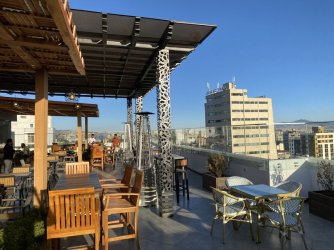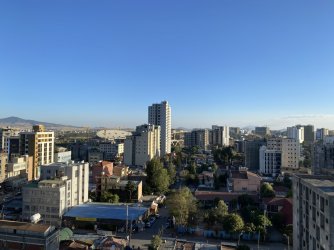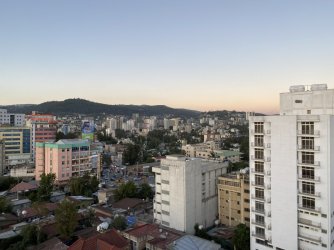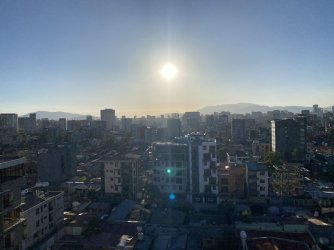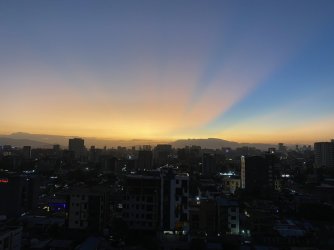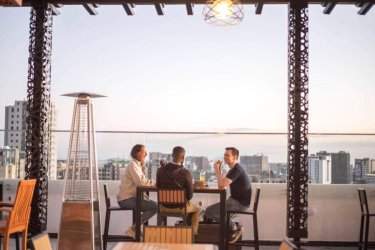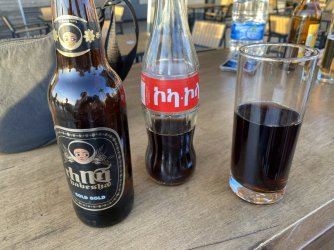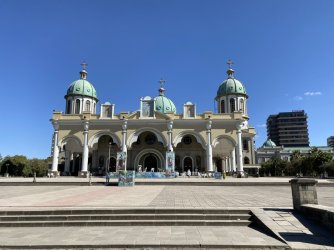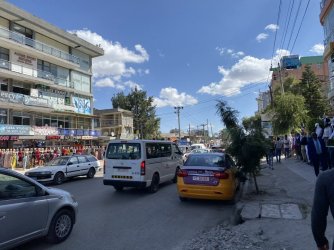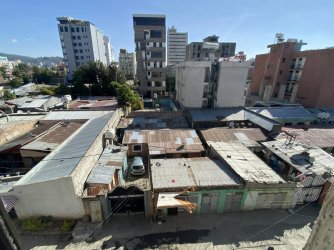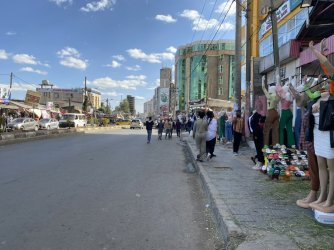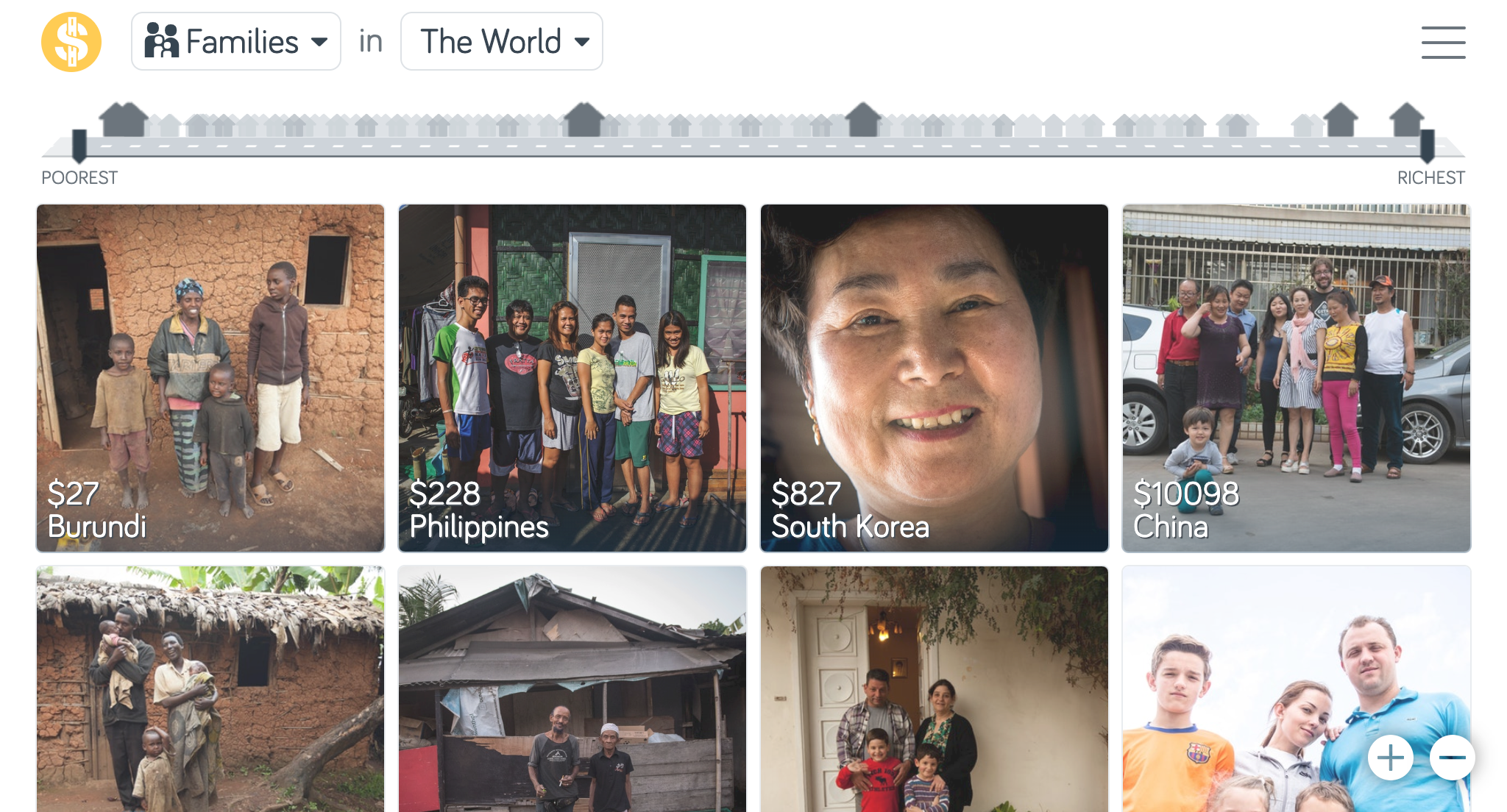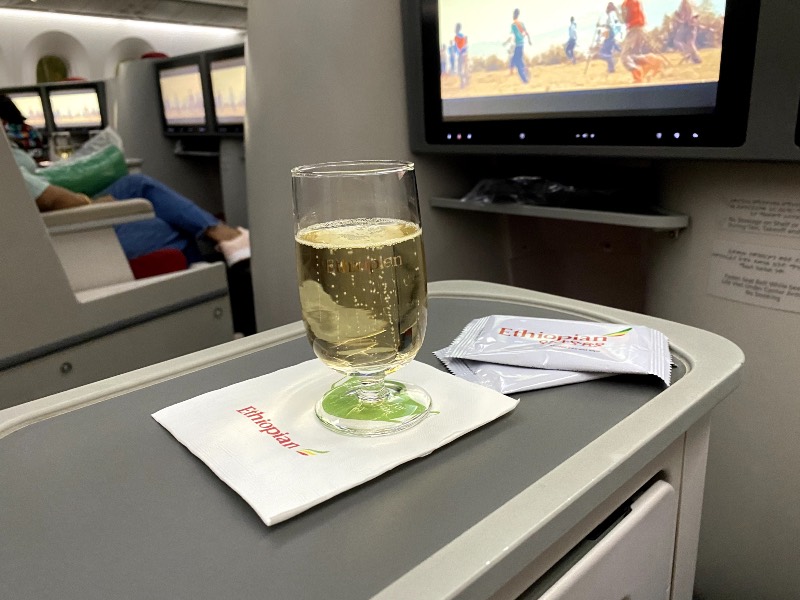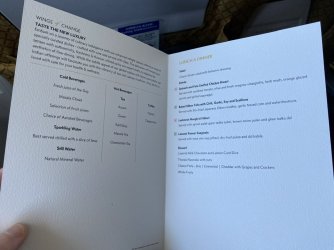- Joined
- Aug 21, 2011
- Posts
- 16,787
- Qantas
- Platinum
- Virgin
- Platinum
- Star Alliance
- Gold
So, onto the Addis Ababa leg of this journey...
It didn’t take long at all to clear immigration in Addis Ababa and I headed downstairs to the baggage claim area.
I didn’t have any local currency (Ethiopian birr) with me. There was a long row of ATMs in the baggage claim hall, each from different banks, so I thought I’d withdraw some cash. Well, that was easier said than done! I had to try 5 or 6 before finding one that was actually working and able to dispense cash.
I just got a small amount of birr to cover the trip to my hostel and the first day or so. I needed cash for most purchases, but withdrawing from an ATM using an overseas card works out to be relatively poor value because you then get the “official” exchange rate. This exchange rate appears to be artificially inflated, as you can get almost double the value by exchanging USD on the street or with a trusted local. So, my advice would be to bring some USD with you.
I had absolutely no idea what to expect when arriving in Addis, and was pleasantly surprised to find that the airport arrivals hall was calm and quiet. Unlike at Melbourne Airport, nobody tried to offer me a taxi. Instead, I walked over to a taxi desk where they organised a cab for me at a fixed price of ETB600 (around $7 at the unofficial exchange rate, or $12 at the official rate).
The taxi was a beaten-up old car with masking tape barely keeping the rear vision mirrors attached. There was definitely no air conditioning, but luckily I was visiting in Ethiopia’s version of winter.
As an alternative to taxis, many Ethiopians use the Ride app to get around. It’s the local version of Uber and seemed to work well, if you had data available on your phone.
Being my first time in the country, I was glued to the window for the whole trip from the airport. The roads were a bit chaotic, but the thing I most remember was people herding goats along the side of the main road into town.
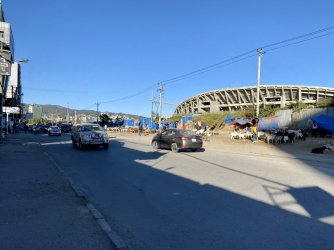
I deliberately chose to stay in a backpacker hostel in Addis Ababa because I was travelling solo for this part of the trip and wanted to meet other travellers. I booked a dorm room at Mad Vervet hostel, which cost around $10/night and did the job, although the accommodation was quite basic. The bed wasn’t comfortable at all and running water was intermittent. The hostel kitchen was also in need of a deep clean. But, I would stay there again for the social atmosphere and am grateful to have met some very interesting people during my stay there.
On my first afternoon I met a German lady at the hostel who had been in Ethiopia and some of the neighbouring countries for a long time. We went for lunch together at a rather nice restaurant serving traditional Ethiopian food. This would be my first of many meals of injera with shiro and other unknown accompaniments. Injera is the Ethiopian bread, and shiro was like a hot creamy soup made of chickpeas and spices (for lack of a better description). It was delicious, and came with some delicious Ethiopian coffee served in the traditional way.

Over the following days, I really quite enjoyed stopping off at street stalls serving traditional coffee and just watching this fascinating world, so different to anything I’m used to, take place around me. The coffee was good too, and generally cost around 10-15 birr (less than 50 cents).
It didn’t take long at all to clear immigration in Addis Ababa and I headed downstairs to the baggage claim area.
I didn’t have any local currency (Ethiopian birr) with me. There was a long row of ATMs in the baggage claim hall, each from different banks, so I thought I’d withdraw some cash. Well, that was easier said than done! I had to try 5 or 6 before finding one that was actually working and able to dispense cash.
I just got a small amount of birr to cover the trip to my hostel and the first day or so. I needed cash for most purchases, but withdrawing from an ATM using an overseas card works out to be relatively poor value because you then get the “official” exchange rate. This exchange rate appears to be artificially inflated, as you can get almost double the value by exchanging USD on the street or with a trusted local. So, my advice would be to bring some USD with you.
I had absolutely no idea what to expect when arriving in Addis, and was pleasantly surprised to find that the airport arrivals hall was calm and quiet. Unlike at Melbourne Airport, nobody tried to offer me a taxi. Instead, I walked over to a taxi desk where they organised a cab for me at a fixed price of ETB600 (around $7 at the unofficial exchange rate, or $12 at the official rate).
The taxi was a beaten-up old car with masking tape barely keeping the rear vision mirrors attached. There was definitely no air conditioning, but luckily I was visiting in Ethiopia’s version of winter.
As an alternative to taxis, many Ethiopians use the Ride app to get around. It’s the local version of Uber and seemed to work well, if you had data available on your phone.
Being my first time in the country, I was glued to the window for the whole trip from the airport. The roads were a bit chaotic, but the thing I most remember was people herding goats along the side of the main road into town.

I deliberately chose to stay in a backpacker hostel in Addis Ababa because I was travelling solo for this part of the trip and wanted to meet other travellers. I booked a dorm room at Mad Vervet hostel, which cost around $10/night and did the job, although the accommodation was quite basic. The bed wasn’t comfortable at all and running water was intermittent. The hostel kitchen was also in need of a deep clean. But, I would stay there again for the social atmosphere and am grateful to have met some very interesting people during my stay there.
On my first afternoon I met a German lady at the hostel who had been in Ethiopia and some of the neighbouring countries for a long time. We went for lunch together at a rather nice restaurant serving traditional Ethiopian food. This would be my first of many meals of injera with shiro and other unknown accompaniments. Injera is the Ethiopian bread, and shiro was like a hot creamy soup made of chickpeas and spices (for lack of a better description). It was delicious, and came with some delicious Ethiopian coffee served in the traditional way.

Over the following days, I really quite enjoyed stopping off at street stalls serving traditional coffee and just watching this fascinating world, so different to anything I’m used to, take place around me. The coffee was good too, and generally cost around 10-15 birr (less than 50 cents).








